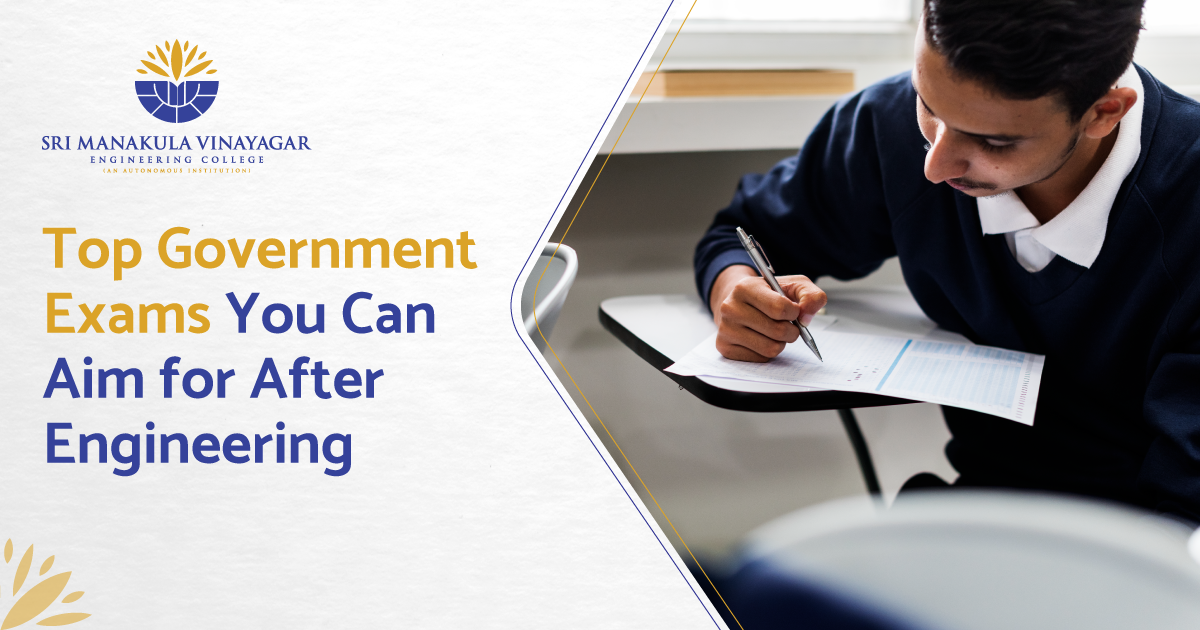Engineering is a dynamic field with numerous career opportunities both in the private sector and in government organisations. For engineering graduates, one of the most promising career paths lies in the vast array of Government Exams After Engineering.
These exams offer a gateway to some of the most prestigious roles in the country, such as those in the IAS, IES, and PSUs. In this blog, we will delve into the top government exams engineering graduates can aim for, the preparation required, and how pursuing a career in the government sector can benefit them.
Why Choose Government Exams After Engineering?
Government jobs offer job security, competitive salaries, and the chance to make a significant impact on society. Unlike the private sector, where job stability can fluctuate based on market trends, government positions provide a more stable career. Some of the biggest advantages of opting for government exams after engineering include:
- Job Security: Government jobs are known for their stability and long-term career prospects.
- Attractive Salaries and Benefits: While government jobs may not always offer the same pay as the private sector, they come with attractive allowances, pensions, and other benefits.
- Work – Life Balance: Most government positions offer a comfortable work – life balance, which is often challenging to find in the private sector.
- Chance to Serve the Nation: Government jobs offer the unique opportunity to contribute to the nation’s development, be it through engineering services or administrative roles.
Given these benefits, it’s no surprise that many engineering graduates choose to take Government Exams After Engineering to pursue careers in various government sectors.
Top Government Exams You Can Aim for After Engineering
1. Indian Engineering Services (IES)
The Indian Engineering Services (IES), now known as the Engineering Services Examination (ESE), is one of the most prestigious exams that engineering graduates can take. It is conducted by the Union Public Service Commission (UPSC) and offers candidates a chance to join various government departments in technical roles.
Eligibility:
Candidates must hold a degree in engineering from a recognised university. The age limit for the exam is between 21 and 30 years.
Exam Pattern:
The IES exam consists of three stages:
- Preliminary Exam: It tests the basic engineering knowledge of candidates.
- Main Exam: This is a detailed exam consisting of two papers in the chosen engineering discipline.
- Personality Test/Interview: Candidates who qualify for the written exams are then called for an interview.
Benefits:
- High profile roles in government departments.
- Opportunity to work in various sectors like Railways, Power, Telecommunications, and more.
- Career growth with competitive pay scales and allowances.
For engineering graduates from SMVEC College, cracking the IES exam can pave the way for an excellent career in government engineering services, where you can work on high impact projects contributing to national infrastructure.
2. GATE (Graduate Aptitude Test in Engineering)
While GATE is not strictly a government exam, it is often a prerequisite for securing a job in public sector undertakings (PSUs). The exam tests the detailed understanding of various undergraduate subjects in engineering and is used by many PSUs to hire candidates for positions in their organisations.
Eligibility:
Candidates with a Bachelor’s degree in engineering (or equivalent) are eligible to take the exam. The exam is open to graduates in various engineering disciplines.
Exam Pattern:
The GATE exam consists of multiple choice questions (MCQs) and numerical answer questions from subjects like Mathematics, Engineering, and General Aptitude. It is conducted in online mode.
PSU Recruitment via GATE:
After qualifying for GATE, candidates can be recruited by PSUs like:
- BHEL (Bharat Heavy Electricals Limited)
- NTPC (National Thermal Power Corporation)
- ONGC (Oil and Natural Gas Corporation)
- IOCL (Indian Oil Corporation)
Benefits:
- Prestigious job roles in leading PSUs.
- Great salary packages with allowances and growth opportunities.
- Work in industries that play a vital role in India’s economy.
For SMVEC College graduates, excelling in GATE opens doors to highly coveted jobs in these prestigious PSUs, offering both job satisfaction and financial stability.
3. Civil Services Exam (IAS/IPS/IFS)
For those with a flair for management, administration, and governance, the Indian Administrative Services (IAS), Indian Police Services (IPS), and Indian Foreign Services (IFS) are top government services to aim for after completing an engineering degree.
The UPSC Civil Services Examination (CSE) is one of the most competitive and challenging exams in India, which selects candidates for high level administrative roles in the central government.
Eligibility:
The minimum educational qualification is a bachelor’s degree in any discipline. Engineering graduates are particularly valued due to their analytical and problem solving skills.
Exam Pattern:
The IAS exam is divided into three stages:
- Preliminary Exam: Objective type questions based on general studies and aptitude.
- Main Exam: Descriptive type questions across several papers, including general studies, one optional subject, and an essay.
- Interview: The final round involves a personality test.
Benefits:
- A chance to become a key part of the government machinery.
- Opportunities to serve in diverse sectors such as defence, foreign affairs, administration, and public policy.
- The ability to make a significant impact on the nation’s growth and development.
Engineering graduates from SMVEC College have the analytical skills and problem solving abilities that make them strong contenders in the IAS, IPS, or IFS exams. These services offer unmatched prestige and the chance to serve at the highest levels of government.
4. Public Sector Undertakings (PSUs)
Public Sector Undertakings (PSUs) offer a stable and rewarding career for engineering graduates through their recruitment processes, which are typically conducted via exams like GATE or through direct hiring for specific positions.
PSUs are government owned corporations that play an essential role in sectors like energy, defence, telecommunications, and infrastructure. Popular PSUs Hiring via GATE:
- NTPC: India’s largest power generation company.
- ONGC: A key player in the oil and gas sector.
- BHEL: A leading manufacturer of electrical equipment.
- IOCL: A major player in the oil and gas industry.
Eligibility:
The basic eligibility requires a B.Tech/B.E. degree in the relevant engineering discipline. Age limits and other criteria vary by PSU.
Benefits:
- Competitive salary packages with additional allowances.
- Opportunities for career advancement within the PSU.
- Government job security.
For SMVEC College graduates, securing a position in a PSU offers a stable career and the opportunity to work with leading industries that significantly impact the nation’s economy.
5. Defence Services (Indian Army, Navy, Air Force)
Engineering graduates can also explore opportunities in the Indian Armed Forces, including the Army, Navy, and Air Force, through exams such as the Indian Army Technical Entry Scheme (TES), Indian Air Force Engineering Branch, and Indian Navy’s Engineering Cadre.
Eligibility:
Candidates should be graduates in engineering with the specified age limit.
Exam Pattern:
The selection process involves written exams, physical fitness tests, and interviews. For technical roles, candidates must have a solid engineering background.
Benefits:
- The honour of serving the nation’s defence forces.
- Excellent salaries, pensions, and allowances.
- Unique career challenges that test both leadership and technical abilities.
Graduates from SMVEC College with an interest in defence services can consider these exams to be part of the prestigious Indian Armed Forces.
6. Banking Exams (IBPS, SBI PO)
The Indian Banking Personnel Selection (IBPS) and State Bank of India (SBI) conduct exams for the recruitment of probationary officers (PO) and clerks in various public sector banks. For engineering graduates, these roles offer an excellent balance of responsibility, leadership opportunities, and good financial benefits.
Eligibility:
Candidates must possess a bachelor’s degree in any discipline from a recognised university. Engineering graduates can easily fit into these roles due to their strong analytical and problem solving abilities.
Exam Pattern:
- Preliminary Exam: Objective type questions.
- Main Exam: Detailed assessment including reasoning, English, quantitative aptitude, and general knowledge.
- Interview: A final round to evaluate the candidate’s suitability for the role.
Benefits:
- Competitive salary with regular increments.
- Opportunities for career progression within the banking sector.
- The chance to serve in key administrative and financial roles.
Final Thoughts
The government sector offers engineering graduates many rewarding career options through Government Exams After Engineering. Whether it is through prestigious exams like IES, GATE, or IAS, or by securing a position in a PSU, each of these exams provides a unique opportunity to contribute to the country’s growth and development.
Choosing a career in the government sector may require dedicated preparation and commitment, but the long term benefits make it a highly attractive path. If you are preparing for GATE, planning to crack the IES, or aspiring to join the Indian Civil Services, the road ahead offers ample opportunities for engineering graduates.
FAQs:
1. What are the best government exams for engineering graduates?
Engineering graduates can aim for several prestigious government exams, including the Indian Engineering Services (IES), GATE (Graduate Aptitude Test in Engineering) for PSUs, Indian Civil Services (IAS/IPS), Public Sector Undertakings (PSUs) exams, and Defence Services exams.
2. How can I prepare for government exams after engineering?
Preparation for government exams after engineering requires a solid study plan, a clear understanding of the syllabus, and consistent practice. It is crucial to focus on engineering fundamentals, general knowledge, and current affairs. Joining coaching institutes or using online resources can also help simplify your preparation.
3. Can engineering graduates apply for the Indian Civil Services exams (IAS/IPS)?
Yes, engineering graduates can apply for the Indian Civil Services exams (IAS/IPS), as the eligibility criteria for these exams include a bachelor’s degree in any discipline.
4. What is the role of GATE in government job recruitment?
GATE (Graduate Aptitude Test in Engineering) is an essential exam for engineering graduates seeking jobs in Public Sector Undertakings (PSUs) like ONGC, BHEL, and NTPC. It serves as a gateway for recruitment in these companies and offers high-paying roles in various sectors like power, oil, and gas.
5. What are the benefits of government jobs for engineering graduates?
Government jobs offer job security, competitive salaries, pensions, and a work-life balance. Engineering graduates working in government sectors like PSUs or through exams like IES or GATE can also contribute to national growth while enjoying stable career growth and development.



